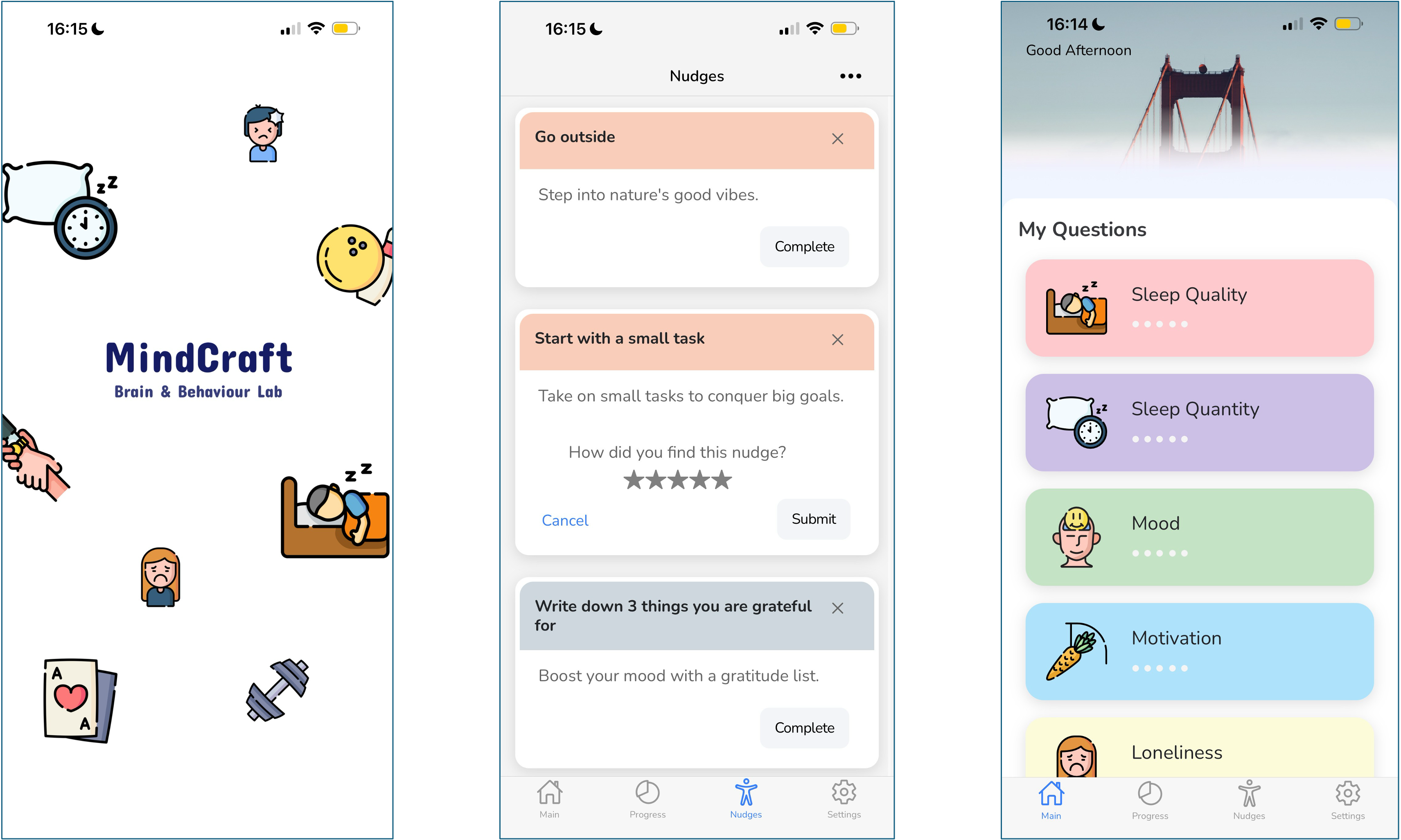A digital tool to track mental health and wellbeing in young people and develop new just-in-time support and interventions
 Mental health problems in young people are a global public health concern. In the UK, over 90% of young people own smartphones, and increasingly use apps for mental health monitoring. Such monitoring can increase self-awareness, reduce distress, and promote personalised care.The MindCraft app, developed by the Brain & Behaviour Lab, Department of Bioengineering, Imperial College London in collaboration with young people, combines active and passive tracking to monitor children and young people's (CYP) emotions and behaviour. It utilizes artificial intelligence (AI) algorithms to identify latent patterns of affect and behaviour dysregulation and provide personalised, instantaneous recommendations.
Mental health problems in young people are a global public health concern. In the UK, over 90% of young people own smartphones, and increasingly use apps for mental health monitoring. Such monitoring can increase self-awareness, reduce distress, and promote personalised care.The MindCraft app, developed by the Brain & Behaviour Lab, Department of Bioengineering, Imperial College London in collaboration with young people, combines active and passive tracking to monitor children and young people's (CYP) emotions and behaviour. It utilizes artificial intelligence (AI) algorithms to identify latent patterns of affect and behaviour dysregulation and provide personalised, instantaneous recommendations.
The MindCraft app is intended as a tool that can be applied across public health and clinical settings, such that it could benefit areas of health spanning from general well-being management to early identification of risk for mental ill health, and to secondary relapse prevention and intervention in diagnosed clinical populations.
The MindCraft app has been tested for feasibility and acceptability in a school-based study of young people via the Schools Research Network in North West London. Our study also demonstrated that tracking on the app can predict mental health difficulties scores on a standard validated questionnaire in adolescents.
We are now running two projects to extend this pilot in schools and clinical populations in NHS settings.
Screenshots of the MindCraft app:

MindCraft in clinics
This project aims to evaluate the feasibility and acceptability of using the MindCraft app by young people with mental health difficulties within routine practice in NHS secondary mental health services, including clinicians’ experience of working with young people.
Inclusion Criteria
- Aged 12 to 25
- Accessing secondary mental health care in West London NHS Trust
- English language ability to permit the assessment and experimental measures to be completed and use of the smartphone app
- Access to an iOS or Android smartphone with embedded activity monitor
- Commitment to over one-month study period
- Accessing secondary mental health care in West London NHS Trus
Exclusion Criteria:
- Not fluent in English
- Being currently very unwell (e.g., very suicidal)
- Severe learning disability
Getting involved:
If you have questions, need more information, or would like to express your interest, we encourage you to contact the study team at mindcraft@imperial.ac.uk and follow our Instagram page @mir_imperial
Your participation could make a difference!
MindCraft in schools
Digital mental health interventions offered in schools could present a readily accessible and flexible means to support young people’s mental health. This study aims to evaluate the efficacy and acceptability of delivering AI-based personalised recommendations for mental health outcomes in young people within schools across North West London. We will conduct two studies, a randomised controlled trial and a focus qualitative study using focus groups.
Inclusion criteria:
- Aged 14 to 18 in years 10 to 13 attending school in North West London
- Sufficient English proficiency
- Access to an iOS or Android-compatible smartphone with an activity monitor
- Capacity to consent (if over 16) or obtain parents/guardians consent (if under 16)
Exclusion criteria:
- Active suicidal risk (measured with item 9 of PHQ-9)
- Learning difficulties, organic brain disease, severe neurological impairment that prevents independent use of smartphone app
Getting involved:
If you have questions, need more information, or would like to express your interest, we encourage you to contact the study team at mindcraft@imperial.ac.uk and follow our Instagram page @mir_imperial
Your participation could make a difference!